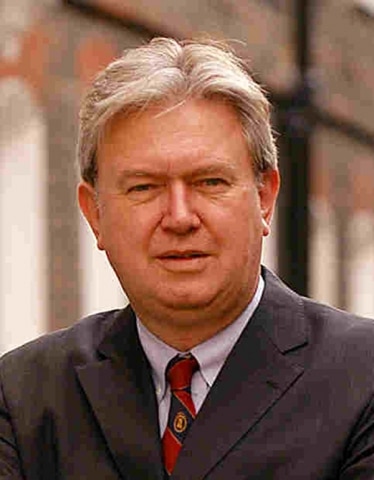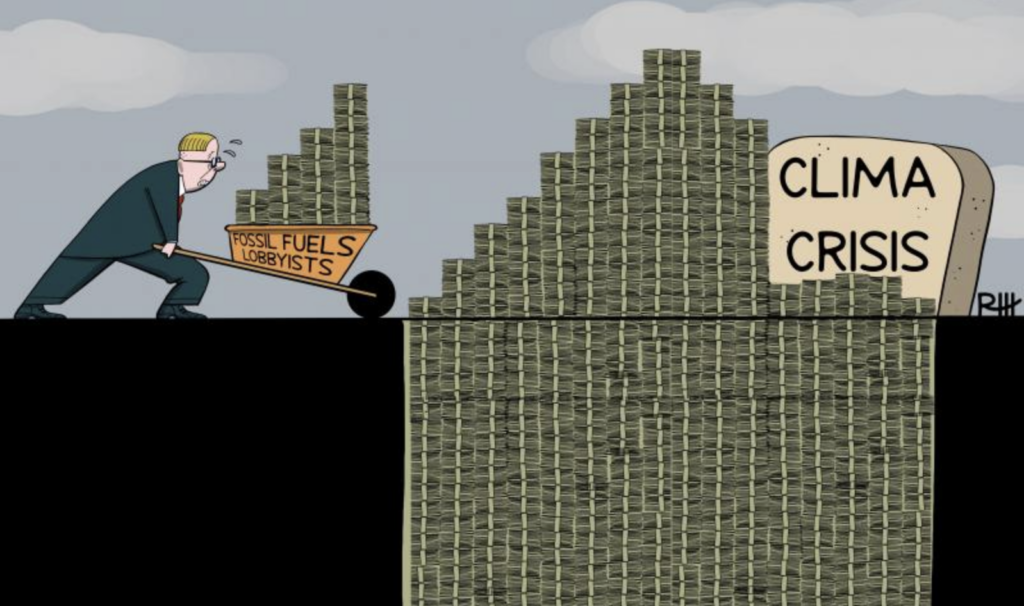John Blundell is welcomed into the inner circle of the Koch elite at at time of inner-family squabbling and political scandal. He soon gains insight into an empire run by obsession and apparent deception. This is part two of DeSmog UK’s history of Blundell and Charles Koch.
Blundell was offered a well paid job at the Institute of Humane Studies (IHS) in April 1982 – a hardline neoliberal think tank funded by the oil billionare Charles Koch.
He resigned as spokesman for the Federation of Small Businesses and as a councillor at a London borough and moved to California in the United States with his wife Christine and their three-month-old baby boy, Miles.
He was still working at the IHS when it moved to George Mason University in Fairfax, Virginia, one of the many front groups and free market think tanks to benefit from Koch funding.
Blundell was very close friends with Antony Fisher, founder of Britain’s Institute of Economic Affairs. The 72-year-old chicken farmer knew that he was dying and asked Blundell for help recruiting a replacement as president of his Atlas Economic Research Foundation.
Blundell recommended a good friend, a retired businessman and fierce exponent of the free market. But Fisher discovered that the appointee spent rather too long on the golf course. “Later he realised that Blundell, a highly effective manager and fundraiser, met the criteria more exactly than any of the other contenders,” according to Gerald Frost, director of the London-based Centre for Policy Studies during the early 1990s.
Blundell took up the job. He moved Atlas over to Fairfax so he could act as president while still running the IHS. He recalled: “I first met Fisher at the IEA in the 1970s and then again when I was living in Menlo Park, California and he was up the road in San Francisco.”
Handed the crown
“He was totally obsessed with building new IEAs. I was already running the Institute For Humane Studies.” Blundell continued. “Fisher knew he was about to turn up his toes. I worked with him on finding somebody to take over Atlas but San Francisco was not that appealing and the think tank was turning over $250,000 a year, so not much at all.
“I said I could do it part time in Virginia easily and that this was a better location by far. He agreed as long as he had an office to the day he died. So for eight months we had two offices.”
Blundell at this time became increasingly aware of the small number of scientists and free market think tanks that had started to challenge the emerging science of climate change.
Asked about global warming, he said: “I recall that as president of Atlas I would put free market-oriented environmental thinking on our workshop agenda in order to make sure it spread outside the USA, or at least to make sure think tanks around the world were at the very least aware of this work.”
Blundell was handed the crown when Fisher died and paid tribute by founding the Sir Antony Fisher memorial awards.
He was also becoming a senior member of the Koch cortège, appointed president of the IHS and also became a member of the Mont Pelerin Society, the neoliberal society founded by Friedrich Hayek and Milton Friedman, among others.
Meanwhile, Charles Koch desperately needed people around him he could trust. A long-running family feud had gone toxic.
Tax Deductible
Koch siblings were accusing each other of syphoning off the family fortune. One had even gone to the extreme of hiring a private eye with the purpose of finding dirt.
This resulted in a full-blown Senate hearing, in-part based on the muck the investigator had raked up.
Koch Industries, the senators were told, had trained its staff to “mis-measure” oil bought from Native Americans, effectively “stealing” $30 million over three years in the process.
The scandal appears to have remained contained in reports in the Mohave Daily Miner but demonstrates the levels of suspicion and distrust at that time.
At the same time, Charles Koch was watching Blundell’s career with keen interest and was extremely impressed by his dedication and quiet determination and decided he was a man who could be trusted.
In March 1991, Koch offered him the prestigious post as president of the Charles G Koch and Claude R Lambe Charitable Foundations from where he would be responsible for distributing millions in tax-deductible philanthropic donations.
The extent of Blundell’s power and the scale of the Koch network of think tanks at this time are revealed in a private letter he typed from his Washington offices to his contact William Orzechowsi in Fairfax, Virginia, in November 1991.
The letter was highly confidential. Blundell was helping recruit the highest generals and the foot soldiers for a huge army of free market detachments and vanguard units.
This included the executive vice president of the Citizens for a Sound Economy, a privatisation policy analyst at the Reason Foundation and two executive directors for the “non-partisan” National Taxpayers Union.
Directors of development were also needed at the Cato Institute, Institute of Humane Studies and Institute for Justice.
One job advert ran: “A citizens action group is seeking a field director to coordinate fundraising, petition drives, media relations, and coalition building with various state level non-partisan campaigns,” adding, “experience in ballot initiatives and petitioning is preferred.”
The list of think tanks included “free market advocacy groups promoting economic freedom” and “lower taxes” working in the fields of social security, medical care, poverty, welfare, education choice, regulation, trade, labour relations and the environment.
He asked for specialists in lobbying, media relations, recruiting students and visiting scholars and “mobilising grassroots support.”
Blundell’s overarching seat would establish the foundations for his direct role in the growing climate denial movement.
Read the whole series: Neoliberalism to Climate Denial
Photo: Creative Commons
Subscribe to our newsletter
Stay up to date with DeSmog news and alerts







